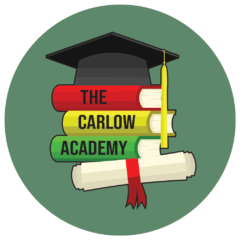More study techniques & templates are available in the member only log in forum on Edmodo when you become a ‘member’ at The Carlow Academy; just another added feature to being a member & supporting local ☺
- Make a new study schedule for over the school holidays, you have all day to fit in those valuable study hours!
- Flashcards, mind maps, concept maps, fish bone diagrams are all very helpful and quick to scan through if you have a spare 20 minutes. Any study time helps!
- Have a study board in your bedroom or in your study room at home and hang up your work there
- Stuck for time? Write out some of your notes and hang them on the fridge door. Then when you are having a meal in the kitchen use the time to revise (great for learning vocab)
- Fish helps boost brain power & concentration (nuts, dark chocolate & blueberries are also great)
- Treat yourself! It’s easier when there’s a reward waiting at the end, like your favourite ice-cream at the end of the study session.
- Keep in mind that your exams are timed so remember to practice answers in the set time limit. Also, practice writing your answers, sitting down & writing non-stop for a few hours (as you have to during an exam) can be very tiring.
- Losing one night’s sleep can impair reasoning and memory for up to 4 days! Make sure to get enough sleep and keep to a regular sleep schedule. EAT STUDY CHILL SLEEP REPEAT ☺ An easy to follow routine is very important for real exam success ☺
- Spend your study time in a room with plenty of light. Make sure you have a good lamp so that your eyes don’t get tired.
- We store information more securely when we write it out by hand than when we type it. Get those pens out and don’t rely on computers or tablets!
- Skip questions if you are unsure or feeling “frozen”, another section may trigger the response, but make sure to leave enough time to come back to the question you skipped.
- There is no magic formula when it comes to developing good study habits. Not everyone learns the same way. So, not everyone will study the same way. Some people need absolute silence to review textbooks, lecture notes, and handouts to prepare for an exam. Others study better in a group bouncing ideas off one another. Play to your strengths and you’ll study more efficiently.
- Catchy words and phrases are helpful tools for memorisation. Don’t underestimate the power of a silly song or rhyme, either!
- Reading information out loud means mentally storing it in two ways, seeing it and hearing it. Perhaps, you could even record yourself ☺
- It is best to review the material right after class when it’s still fresh in your memory.
- Use your parents, siblings and friends for help. Explain an answer to a question to them; it helps you to get it clear in your head and in your own words. Working together collaboratively can significantly reduce the workload e.g. let’s take maths as an example if one of your friend’s made up revision notes on ‘Algebra’ and then you made up revision notes on ‘Trigonometry’ and someone else does ‘Differentiation’ then before you know it between a small or large circle of friends (all of whom are in the same boat) you have all created valuable revision notes in many different formats [i.e. flashcards, fish bone diagrams, mind maps etc] for each of you to study for your imminent exams .
Note Making |
|
Whenever you study you should get into the habit of making notes. You CANNOT study by just reading or highlighting, a book. I know that many students believe that taking notes is a waste of time, but there is really no other way if you want to remember the information! Notes are just the key points Don’t write sentences or include “little word” e.g. and/or/the Always number the points in the list you construct (The brain can recall numbered lists better) Have plenty of white space on the page (It should almost look like a shopping list)-do not overcrowd flashcards with information & use plenty of colour ☺ Do not copy diagrams into your notes-If you come to a diagram of importance (e.g. drawing the heart in science) Close the book, have a quick attempt at drawing it (on scrap paper), correct your mistakes and throw away the attempt. Now, make a note of the diagram and its page number in the margin of your notes. Each time you return to these notes, you will see the reference and quickly practice the diagram once more. Homework Don’t copy your homework answers out of the textbook – You learn little by copying Read the information required to answer the question; underline keywords to reference Write down on a piece of paper the briefest points (a date/formula/name/acronym etc.) that may help you remember them Move onto another task and come back to the question and attempt to answer with the book closed (If you get stuck refer to the piece of paper with brief notes) |
All Goals should be “SMART”Specific (not something vague)
|
Whenever you are studying, always remain positive & keep in mind☺“The Principle of Learning”
|
